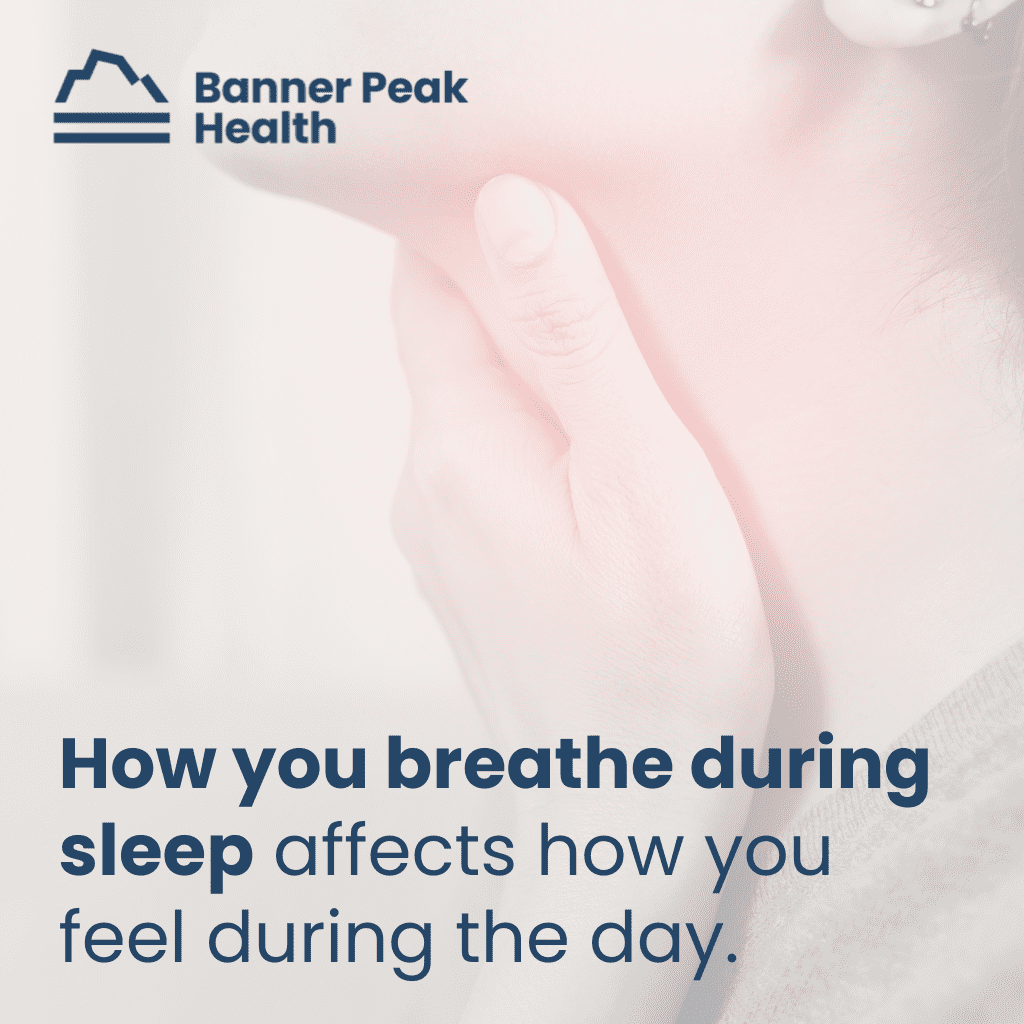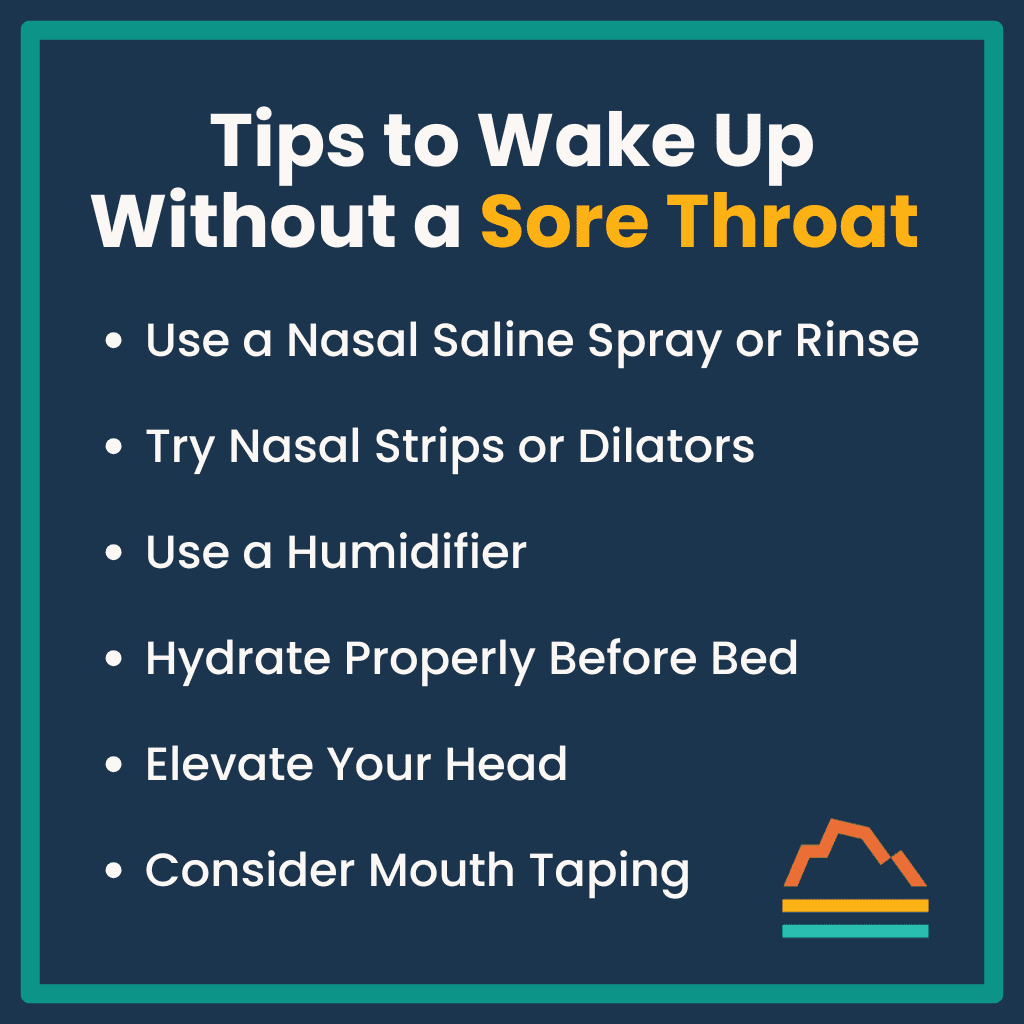Waking up with a sore throat may seem like a minor irritation your morning coffee will wash away. But what if that discomfort is a red flag?
In my practice, I see this symptom frequently. It often signals a more severe issue: how you sleep, how you breathe, and what’s happening in your body overnight.
Mouth Breathing + Dehydration = The Perfect Storm
While you sleep, your body is in recovery mode. Ideally, you breathe through your nose, stay hydrated, and move through sleep cycles uninterrupted.
But for many people, that’s not the case.
If you sleep with your mouth open, you bypass the natural humidification and filtration system your nose provides. Air flowing through the mouth dries the delicate tissues in your throat. Add in the natural dehydration that occurs overnight (especially if you don’t drink water in the hours before bed or if you sleep in a dry room), and you’ve created a perfect storm for irritation.
The result is a dry, scratchy, sore throat.
Why Are You Mouth Breathing?
Mouth breathing is usually a compensation, not the preferred route. What’s forcing you to do it?
- Nasal Congestion — This is the most common cause. Allergies, chronic sinusitis, or even a deviated septum can block nasal airflow, especially when you lie down. Your body adapts by opening the mouth.
- Medications — Certain medications, especially anticholinergics, some antihistamines, and antidepressants, can dry out your mucous membranes. That makes your throat feel sore and irritated, even if you’re not fully congested.
- Alcohol and Caffeine — Both are dehydrating and can reduce REM sleep quality, indirectly contributing to poor breathing patterns and dryness.
- Sleep-Disordered Breathing — Conditions like sleep apnea or upper airway resistance syndrome often force the mouth open during sleep to maintain airflow. That contributes to dryness and inflammation over time.
When It’s More Than Dry Air
A dry room or low overnight humidity can cause a sore throat, but the persistence, severity, and associated symptoms differentiate between a benign cause and a more serious issue.
Here are red flags that warrant medical evaluation:
- You wake up tired, regardless of how long you slept.
- Your partner notices loud snoring or pauses in breathing.
- You wake with a sore throat and a headache daily.
- You have frequent nighttime awakenings with dry mouth.
- You also experience heartburn, hoarseness, or a bitter taste (suggesting reflux).
These symptoms may point to obstructive sleep apnea, nocturnal GERD, or chronic nasal obstruction. All are treatable and worth discussing with your doctor.
What You Can Do Tonight
If you’re ready to take action and wake up more comfortably, here are my top evidence-based strategies:
- Use a Nasal Saline Spray or Rinse — This clears congestion and supports nasal breathing.
- Try Nasal Strips or Dilators — OTC products like Breathe Right strips mechanically open the nasal passages.
- Use a Humidifier — Aim for 40–50% relative humidity in your bedroom.
- Hydrate Properly Before Bed — Stop caffeine and alcohol in the evening, and drink water throughout the day.
- Elevate Your Head — A slight incline can reduce reflux and improve nasal drainage.
- Consider Mouth Taping — For some patients, this encourages nasal breathing (only after nasal patency is confirmed).
Breathing Better at Night = Energy During the Day
How you breathe during sleep affects how you feel during the day.
Poor nasal airflow, disrupted breathing, and dehydration compound over time, affecting everything from immune health to mental clarity. Fortunately, with the right insight and small, consistent adjustments, it’s often fixable.
At Banner Peak Health, we treat every symptom like a signal. If you wake up with a sore throat regularly, it’s worth digging deeper. We’re here to help you breathe better, sleep better, and feel better.


Barry Rotman, MD
For over 30 years in medicine, Dr. Rotman has dedicated himself to excellence. With patients’ health as his top priority, he opened his own concierge medical practice in 2007 to practice medicine in a way that lets him truly serve their best interests.




